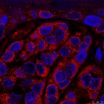(Press-News.org) A new data analysis technique radically improves monitoring of kidney patients, according to a University of Leeds-led study, and could lead to profound changes in the way we understand our health.
The research, published in the journal PLoS Computational Biology, provides a way of making sense out of the huge number of clues about a kidney transplant patient's prognosis contained in their blood.
By applying sophisticated "big data" analysis to the samples, scientists were able to crunch hundreds of thousands of variables into a single parameter indicating how a kidney transplant was faring.
That allowed the team of physicists, chemists and clinicians to predict poor function of a kidney after only two days in cases that may not previously have been detected as failing until weeks after transplant.
The extra few days would give doctors a better chance to intervene to save a transplant and improve patient recovery periods. In some cases, the team were able to predict failure from patients' blood samples taken before the transplant operation.
Dr Sergei Krivov, research fellow in the University of Leeds' Astbury Centre for Structural Molecular Biology, who led the research, said: "If you put a blood sample through Nuclear Magnetic Resonance analysis you get a very large number of different parameters that vary with the outcome for a patient.
"These are vital clues but, if you have got thousands of variables all moving in different ways in a complex system, how does a doctor bring all that information together and decide what to do? It is not possible to do this with the human mind; there are just too many variables. We have to do it with computers."
The study, which analysed daily blood samples from 18 patients immediately before and in a week-long period after kidney transplants, produced a single "optimal reaction coordinate" from the thousands of variables. This was translated to a single number (on a continuous scale from 0 to 1) describing the likelihood of a patient's state at any one time resulting in organ success or failure.
Dr Krivov said: "It is a bit like measuring GDP in the economy: a single number quantifying a huge amount of complex activity and allowing you to understand the dynamics of the system."
He added: "One of the advantages is that the output is not binary. In the past, we have tended to make decisions based on certain physical parameters. Depending on the current value or a large movement in such an indicator, we have decided whether a patient is 'healthy' or 'unhealthy' and whether or not they require treatment. At the simplest level, that could be taking their temperature. The new approach describes the dynamics of the whole system and quantifies on a continuous scale where the patient is."
Importantly, the technique does not depend on an understanding of the exact mechanism of kidney disease and is therefore, in principle, applicable in many other areas.
Dr Krivov said: "I am not a kidney specialist. I just need the data. I can then analyse it using the same equation we used here to describe the dynamics of a condition. This could be particularly powerful in areas where you are dealing with slowly developing and complex conditions, where you need to get away from a healthy-unhealthy dichotomy and engage with the incremental dynamics of the disease."
Given enough data, the technique could even be used to quantify very complex and extended processes affecting the whole population and could, ultimately, change our way of seeing our health.
"It would require a lot of data and a lot of people regularly giving their data but there is nothing in theory to stop us applying this to something like age, for instance," Dr Krivov said.
"If you are looking at biological aging, what is the best way to quantify it? You don't just have two states: 'old' or 'young'. It is a really slow process and it is certainly not described by your passport age. If we can quantify your age in a biological way, we can change the way you see your life and health. If you have a number describing it, you can see where you are speeding up biological aging and you can then work out ways to slow it down or even reverse it."
INFORMATION:
Further information
Dr Sergei Krivov is available for interview.
Contact: Chris Bunting, Senior Press Officer, University of Leeds; phone: +44 113 343 2049 or email c.j.bunting@leeds.ac.uk
The full paper: Sergei V. Krivov et al., 'Optimal Reaction Coordinate as a Biomarker for the Dynamics of Recovery from Kidney Transplant,' PLoS Computational Biology (2014) is available as a preview to members of the media at: http://www.plos.org/wp-content/uploads/2014/06/plcb-10-06-krivov.pdf .
'Big data' technique improves monitoring of kidney transplant patients
2014-06-27
ELSE PRESS RELEASES FROM THIS DATE:
Global healthcare is a labour of Hercules
2014-06-27
Einstein once observed that "it is harder to crack prejudice than an atom". If he was right, then Hans Rosling is faced with a labour of Hercules. As Professor of International Health at the Karolinska Institute in Stockholm, he finds himself fighting against the cliché that the world is divided between rich and poor. "This neat division simply no longer exists. The statistics reveal a far more complex picture, with more and more people worldwide living in relative prosperity. This means that in health research in particular it is time for a paradigm shift," says Rosling. ...
Sex hormone levels at midlife linked to heart disease risk in women
2014-06-27
PITTSBURGH, June 27, 2014 – As hormone levels change during the transition to menopause, the quality of a woman's cholesterol carriers degrades, leaving her at greater risk for heart disease, researchers at the University of Pittsburgh Graduate School of Public Health discovered.
The first-of-its-kind evaluation, supported by the National Institutes of Health (NIH), was done using an advanced method to characterize cholesterol carriers in the blood and is published in the July issue of the Journal of Lipid Research.
The results call for further research to evaluate ...
New form of brain signaling affects addiction-related behavior
2014-06-27
University of Iowa researchers have discovered a new form of neurotransmission that influences the long-lasting memory created by addictive drugs, like cocaine and opioids, and the subsequent craving for these drugs of abuse. Loss of this type of neurotransmission creates changes in brains cells that resemble the changes caused by drug addiction.
The findings, published June 22 in the journal Nature Neuroscience, suggest that targeting this type of neurotransmission might lead to new therapies for treating drug addiction.
"Molecular therapies for drug addiction are ...
Homeless alcoholics typically began drinking as children
2014-06-27
WASHINGTON — A phenomenological study offers detailed insights into homeless, alcohol-dependent patients often stigmatized by the public and policymakers as drains on the health care system, showing the constellation of reasons they are incapable of escaping social circumstances that perpetuate and exacerbate their problems The study, published online yesterday in Annals of Emergency Medicine, was conducted at Bellevue Hospital in New York City, which has a long history of service to the city's indigent population.
"One hundred percent of patients enrolled in the study ...
CNIO researchers discover more than 40 melanoma-specific genes that determine aggressiveness
2014-06-27
Researchers from the Spanish National Cancer Research Centre (CNIO) have discovered more than 40 genes that predict the level of aggressiveness of melanoma and that distinguish it from other cancers with a poor prognosis. The discovery, published in Cancer Cell, will help to identify unique aspects of melanoma that could contribute to determine the risk of developing metastasis in patients with this disease. This study is relevant because it explains why a drug, also described by CNIO, is being used to selectively attack the melanoma tumour cells. Melanoma is one of the ...
NIH scientists establish proof-of-concept for host-directed tuberculosis therapy
2014-06-27
WHAT:
In a new study published in Nature, scientists describe a new type of tuberculosis (TB) treatment that involves manipulating the body's response to TB bacteria rather than targeting the bacteria themselves, a concept called host-directed therapy. TB remains a major cause of disability and death worldwide as an estimated 8.6 million people fell ill with TB and 1.3 million people died from the disease in 2012, according to the World Health Organization. Although TB is curable, adherence to therapy is difficult as treatment requires taking antibiotic drugs for at least ...
Walking the rocks: GSA Today article studies undergraduate field education
2014-06-27
Boulder, Colorado, USA – In the July 2014 issue of GSA Today, Heather Petcovic of Western Michigan University and colleagues Alison Stokes and Joshua Caulkins examine the question of geoscientists' perceptions of the value of undergraduate field education. Despite being perceived as integral to both geoscience learning and professional preparation, little research exists on the types of field experiences that carry the most value.
In their study, Petcovic and colleagues compile and analyze survey data obtained during two Geological Society of America (GSA) annual meetings ...
Research provides new theory on cause of ice age 2.6 million years ago
2014-06-27
New research published today (Friday 27th June 2014) in the journal Nature Scientific Reports has provided a major new theory on the cause of the ice age that covered large parts of the Northern Hemisphere 2.6 million years ago.
The study, co-authored by Dr Thomas Stevens, from the Department of Geography at Royal Holloway, University of London, found a previously unknown mechanism by which the joining of North and South America changed the salinity of the Pacific Ocean and caused major ice sheet growth across the Northern Hemisphere.
The change in salinity encouraged ...
Scientists identify new pathogenic and protective microbes associated with severe diarrhea
2014-06-27
In a finding that may one day help control a major cause of death among children in developing countries, a team of researchers led by faculty from the University of Maryland, College Park and the University of Maryland School of Medicine has identified microorganisms that may trigger diarrheal disease and others that may protect against it. These microbes were not widely linked to the condition previously.
"We were able to identify interactions between microbiota that were not previously observed, and we think that some of those interactions may actually help prevent ...
Genetics dominant risk factor in common cancers
2014-06-27
A study of individuals who have been adopted has identified genetics as the dominant risk factor in 'familial' breast, prostate and colorectal cancers.
Researchers at the Centre for Primary Health Care Research at Lund University and Region Skåne in Sweden have presented the new research findings based on studies of population registers.
"The results of our study do not mean that an individual's lifestyle is not important for the individual's risk of developing cancer, but it suggests that the risk for the three most common types of cancer is dependent to a greater ...

